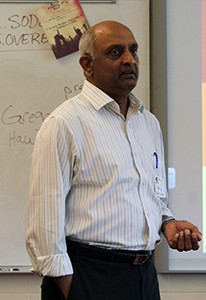Dr. Gopal Visits the Classical Ideas and World Religions Class

Dr. Gopal lectures to Battle students.
On Wednesday morning, engineering professor Dr. Vellare S. Gopalaratnam (Dr. Gopal) gave a lecture in Mr. Soden’s Classical Ideas and World Religions class. Born and raised in India, his Hindu background and firsthand experience with cultures studied within the classroom gave the students a deeper personal perspective. He started off the lecture with stressing the importance of religious literacy among young people, explaining how things such as church and state separation can be “very fuzzy.” Religion impacts every aspect of life; it’s rooted in our morals and personal values, so there can be no way to disconnect yourself from it when making decisions. Dr. Gopal stated that “ignorance is fear,” and the more you know the less you fear. Education leads to open-mindedness and more knowledge means better life choices. Education cannot be defined by degrees, it means to open one’s self up to opportunity and experiences. For example, the Islamic state is making news in the Middle East. Without background knowledge of Muslim holy texts such as the Quran, understanding the situation is impossible and can cause misunderstanding.
Dr. Gopal continued his lecture with the explanation of the basic values held in Hinduism, and how the religion impacts the culture around it. He explained the widely misused phrase “Namaste,” explaining how it translates to praying to the god within you. Hinduism is a very personal religion, every person has godliness inside of them, and the removal of all material connections brings one closer to god, this includes the most immediate of relatives. Dr.Gopal stated that “attachment is temporary, your soul is forever.” Another misconception of Hinduism is the idea of reincarnation: most would believe eternal life to be a reward, in Hinduism it is quite the contrary. Re-birth is the cyclical idea of suffering, the end goal is to stop the cycle and reach enlightenment, “moksha.”
Most people, when they Google or are researching Hinduism, will come across many deities, making it seem like a polytheistic religion. Dr. Gopal referred to it as “monotheistic polytheism”: there is one god, Brahman, and all others are representations and different sides of the one singular god. You can worship whichever suits your needs and think of them as “comfort blankets” making the religion up to personal interpretation. No temple service is necessary, no conversion is necessary, Hinduism is more of an “eternal way of life” or Sanatana Dharma.
The lecture ended in a Q&A session. Ariane Young asked, “how do you think your career in science has affected your religion?” Gopal responded by stating that science is factually based and there are many situations in his life that facts cannot explain and that’s when religion fills in the blanks. Mr. Soden asked, “what sect of Hinduism do you personally follow?” He responded by explaining his prayer to the god Vishnu and his fellow Vishnites, explaining that no matter what god you pray to, “all pathways are perfectly acceptable, do what works best for you.”
Students in Mr. Soden’s class learned a lot during this lecture, connecting information they had already learned with new information and first hand experiences. They can use the new information they obtained to connect with further lessons in the class. Overall it was a great educational experience and the class expects many more guest speakers.

